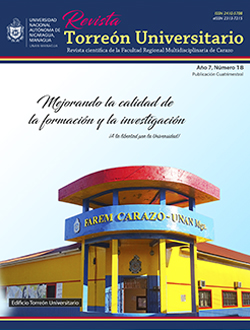Explanations for the presence of atypical patterns of response of a knowledge evaluation test in the FAREM-Carazo
DOI:
https://doi.org/10.5377/torreon.v7i18.7715Keywords:
atypical response patterns, modified precautionary index, knowledge evaluation test, validityAbstract
Test or test type tests provide good academic knowledge acquired by students. Although the tests are designed correctly, with contents representative of the knowledge that is to be evaluated, the results obtained by students who answer the questions atypically can be biased indicators of their levels of knowledge. This possible invalidity of some individual scores can be studied by identifying Atypical Response Patterns (ARP). However, the identification of ARP does not provide information about the causes of it. The objective of this work is to identify some of these possible causes. For this, the answers of a same test of 136 students of three careers taught in the Regional Multidisciplinary Faculty of Carazo, of UNAN-Managua (FAREM-Carazo) have been analyzed. Twenty-six of the students answered atypically, thanks to voluntary interviews with 16 of them; it could be identified as possible explanations for the presence of ARP in the absence of study and the consequent random answers to questions considered difficult or even, in the presence of a response copy. All these reasons justify the doubt about the validity of the scores obtained by those students who gave answers to the test based on aspects different from those of their knowledge in the subject evaluated.
Downloads
Downloads
Published
How to Cite
Issue
Section
License
Los autores que publican en esta revista están de acuerdo con los siguientes términos.
- El autor o los autores de los artículos, ensayos o investigaciones conceden a la Universidad Nacional Autónoma de Nicaragua, Managua (UNAN-Managua) los derechos de edición (copyright) del trabajo enviado, por consiguiente la Universidad cuenta con el derecho exclusivo para publicar el artículo durante el periodo completo de los derechos de autor.
- Estos derechos de autor/ autores autorizan a la Revista Torreón Universitario y a la Universidad editar y divulgar/publicar el artículo en dicha Revista, incluyendo reproducción impresa y electrónica, el almacenamiento, recuperación y cualquier otro tipo de publicación, y fuentes de información secundaria como servicios de resúmenes y bases de datos, así mismo la facultan a proteger el artículo contra el uso no autorizado para su difusión por medios impresos o electrónicos (PDF, HTML, EPUB, XML u otros).
Licencia para el uso del contenido
La revista hace uso de la Licencia Creative Commons Atribución-NoComercial-SinDerivar 4.0 Internacional.
Bajo esta declaración:

Este revista está sujeta a una licencia de Creative Commons Reconocimiento-NoComercial-SinObraDerivada 4.0 Internacional. Puede ser copiada, distribuida y transmitida públicamente siempre y cuando se cite al autor y la fuente (Revista Torreón Universitario), no debe modificarse ni utilizarse con ningún fin comercial. La licencia completa se puede consultar en http://creativecommons.org/licenses/by-nc-nd/4.0/.

